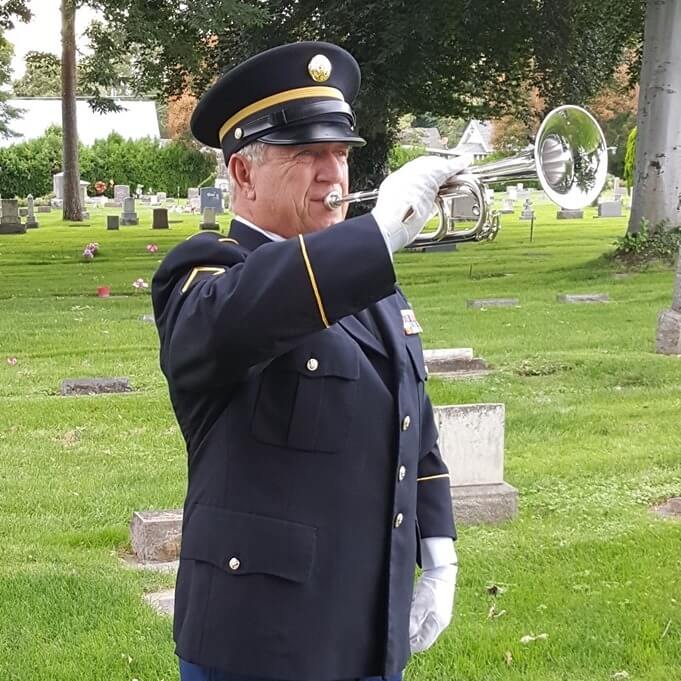When Robin Turner first picked up a bugle about eight years ago, he’d never handled a brass instrument before – let alone played “Taps.”
But the 69-year-old was inspired to try his hand at it after finding out that, due to the ongoing shortage of buglers, Congress allows “boombox” recordings of “Taps” to be played at veterans’ funerals.
“I thought, ‘Wow, that’s kind of a cheesy way of getting around it,” said Turner, who lives in Lewiston, Idaho. “It just ate at me until I finally told myself, ‘Self, you can figure out how to play a bugle.’”
A native of Wisconsin, Turner has since become a member of the all-volunteer nonprofit Bugles Across America and serves as a volunteer bugler with the Idaho National Guard Honor Guard. He plays “Taps” at one or two veterans’ funerals per week, sometimes more, typically within a two-hour radius from his home, but sometimes as far as four hours away.
“When I first started, there were more World War II veterans; sadly, those are becoming fewer and fewer. Now it’s mostly Korea and Vietnam (war) veterans,” he said, adding, “There are too many younger people from the Middle East conflicts.”
Tuner is a veteran of the Army and Air Force, and served about 10 years in active duty. He separated in 1984 and moved to Idaho to manage the regional airport in Lewiston, which remained his job for three decades until he retired.
Relying on his natural aptitude for music, Turner said, he taught himself how to play the bugle using a 1930s Navy instruction manual.
“Not that it came easy, but it was simply a matter of keep trying and keep trying until I was somewhat satisfied,” he said.
After about eight months, he began to visit small town cemeteries, looking for veterans’ headstones so he could play “Taps” by himself and refine his playing.
Eventually, he started taking note of the headstones and researching the history and stories of those veterans. That became the genesis of his self-published book, “Sounding Taps: A Duty of Remembrance,” which tells the stories of about 50 veterans and the proceeds of which go to Bugles Across America.
“There are so many that weren’t laid to rest at Arlington National Cemetery that could have been — and they have some wonderful stories to tell,” Turner said.
So for the Wisconsin native, playing “Taps” is all about giving back.
“It’s a way of saying, ‘Thank you,’ and it’s a way of putting closure,” he said. “’Taps’ is a soldier’s last lullaby … and it’s been that way for 160 years since it was first heard on the battlefield.”
A particularly memorable ceremony was that of a Native American veteran laid to rest in Kamiah, Idaho, he said.
“Several members of the tribe were present to serve as pall-bearers. His simple pine-box casket was covered in a beautiful, colorful Pendleton blanket, and was carried from the main highway to the grave site about two blocks distant,” he said. “Once on site, the blanket was replaced with the American Flag. I can tell you the honor guard did a beautiful job.”
Sgt. 1st Class Candi Anderson, the noncommissioned officer in charge of the Idaho Honor Guard, said Turner has a relentless drive to improve his playing.
“Every time he cracked a note or missed a note, somebody else might have given up … but he doesn’t,” Anderson said. “He digs deeper and practices more, and doesn’t give up. He takes that feedback and works really hard.”
Turner is also known for giving people gifts, such as thoughtfully arranged shadow boxes, even for no reason, she said.
“I don’t think I’ve ever met someone who is as generous as he is,” Anderson said. “He’s a really, really good man with the heart in the right place. We need more of him.”
Turner continues to visit cemeteries to practice “Taps” on his own. No matter how many times he has played at funerals, he said he always has to concentrate hard, lest he get choked up.
“I have to close my eyes and tune out everything that’s around me and wait for my cue, and then simply focus on that wonderful melody,” he said.
He encouraged people to try their hand at the bugle, particularly if they’ve played the trumpet or clarinet.
“’Taps’ is certainly the most difficult 24 notes that anybody can ever play. Once you’ve done it, it’s such a rewarding thing. It helps bring closure to the family, and it’s totally selfless,” he said. “Nine times out of 10, when you finish the service, you join the honor guard for a salute and you march out of the cemetery not having met the family. Because it’s not about you — it’s about that serviceman or woman.”

